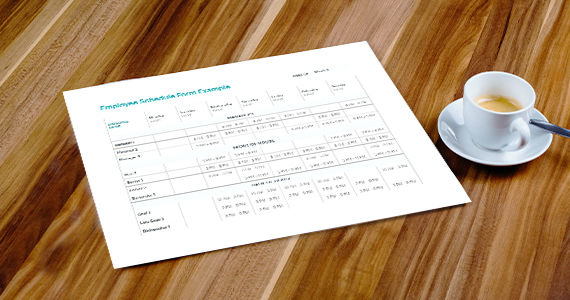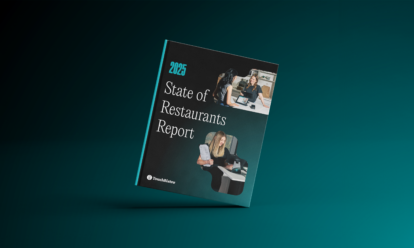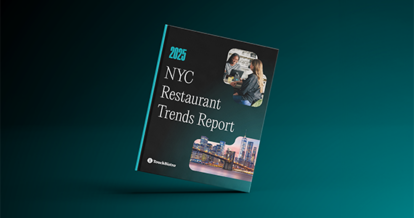The hospitality industry experiences seasonal ebbs and flows, which is why seasonal jobs are so important.
In the summer, sun-loving vacationers journey to beach towns to take advantage of warm waters. During the winter, snowbirds flock to powder-topped mountains, while less hardy travelers seek out tropical climates.
Restaurants in seasonal destinations face the challenge of having the right amount of staff at the right time because revenue can fluctuate dramatically throughout the year. Restaurants need more hands on deck during the high season and a pared down team during the low season.
Fortunately, seasonal jobs help restaurants meet their staffing needs. Restaurants often consider hire temporary workers for a finite period of time to help them keep up with fluctuating demand.
If your restaurant gets an increase in business during the holiday season, it’s never too early to start thinking about temporary restaurant staffing.
We’ve put together this guide to seasonal hiring to help restaurateurs like you get ahead of the curve and create a plan for hiring the best temporary talent in the industry. This guide to seasonal jobs will teach you:
- What seasonal jobs are
- When seasonal jobs are most necessary
- Tips for seasonal hiring
- How to set your seasonal hires up for success
Time is ticking, so don’t let the best temporary hires get away!

Use this sample restaurant employment contract to learn how to draft your own employee contracts.
What Are Seasonal Jobs?
The hospitality industry is subject to tourism-related spikes in business. During busy seasons, restaurants need more staff to continue providing the same level of service and quality they’re capable of during slower periods. Restaurants hire extra servers, cooks, delivery people, and/or hosts on a seasonal basis to fulfill these needs. These temporary workers are hired for a finite period of time. Seasonal jobs come without the expectation that the role will lead to a permanent position.
Seasonal workers are a great asset for restaurants for several reasons.
First, temporary hiring for holiday jobs saves restaurants money. These jobs attract students who have time off from school during peak hospitality seasons. Students are typically less experienced than full-time hospitality workers. They also tend to work hospitality jobs to make some money while they have off from school, and don’t necessarily seek these jobs hoping to develop careers out of them. For these reasons, student seasonal workers can usually be paid lower wages than a full-time staff member.
Let’s say that your restaurant pays the hosts on its permanent staff $9.50 per hour (the average rate in the U.S. for this role, but be sure to check out your state’s minimum wage). And let’s say that your restaurant is located in Georgia and is looking to add a host to its team for the summer. A student wouldn’t mind working for the state’s minimum wage of $5.15 per hour. Your restaurant could save 45% on wages by hiring a student instead of a more senior seasonal worker.
Furthermore, temporary hires are only on payroll for a few weeks or months at a time. Seasonal jobs give restaurants the flexibility to increase labor spending when they need help the most, and decrease it during slower times.
Seasonal staff also make it possible for permanent staff to take time off during the holidays. Instead of making year-round team members work overtime to fill in for each other while they’re on vacation, you can schedule temporary staff to work holiday shifts.
Seasonal jobs help the hospitality industry keep up with demand during busy times throughout the year (and help make these times profitable!), as well as keep labor costs low when extra staff isn’t needed.

When Are Seasonal Workers Needed Most at Restaurants?
So when are seasonal jobs most necessary? When most people are on vacation: summertime and the winter holiday season.
Summer vacation
During the summer, temporary holiday jobs are important in areas that get an influx of tourists: areas near beaches, national parks, amusement parks, big cities, etc. Students and families are taking advantage of time off from school to go on vacation. The summer hospitality high season in North America typically lasts from Memorial Day until Labor Day.
The winter holidays
The winter holiday season is another popular time for vacations and family gatherings. Vacation goers look for places that are sunny and warm (tropical islands, Disneyworld, etc.), or that embrace the cold weather (like ski towns).
Seasonal hires are needed in the winter because regular staff ask for time off for Thanksgiving, Christmas, and/or New Year’s Day. Temporary workers can help fill in the gaps for your team members who have worked hard year-round and deserve some time off.
Seasonal jobs come to the rescue during both the summer and winter holidays.

How to Hire for Seasonal Jobs in the Restaurant Industry
The temporary nature of the role and the short-term length of a seasonal job presents unique hiring challenges.
Here’s how to navigate seasonal hiring to find the best staff for the upcoming holiday season.
1. Identify your restaurant’s needs
First, you have to determine your restaurant’s peak seasons so you know which dates you’ll need your seasonal hires to work. Look at POS sales data from that time period, year over year. When does business typically pick up in the winter? When do you get busy in the summer?
You also need to figure out which roles your restaurant needs back-up for during peak seasons. If your beachfront restaurant has more diners in the summer, you’ll probably need more servers to care for customers, and more cooks to make meals during this time. If your restaurant is in a cold region, you may see an uptick in delivery orders from customers who want to enjoy a delicious meal while staying cozy indoors. You may need to hire extra cooks and delivery drivers to keep up with demand.
Identify the dates you need temporary workers and the positions you need filled.
2. Publish and promote job listings
Once you know what your restaurant needs, it’s time to start the hiring process.
When: Begin hiring for holiday jobs two or three months before the peak season. This timeline gives you a leg up on local competition, and lets you to take your time in making good decisions – instead of choosing unqualified candidates because you’re in a pinch.
Where: Try these tools and methods for finding seasonal talent:
- College students have time off during the summer and winter holidays, when restaurants need extra help the most. Contact local universities to advertise job postings through their job boards.
- Post your job listings to restaurant-industry specific job sites like Poached, Culinary Agents, or RestaurantZone. You’ll attract the right kinds of candidates here.
- Hire your biggest fans. Advertise seasonal openings through your restaurant’s social media.
- Partner with other restaurants to host a seasonal job hiring fair. Teaming up will help you attract more candidates.
- Ask current employees for referrals. Offer an incentive to permanent staff if you hire their recommendations.
Using these channels you’ll find qualified, talented seasonal hires in no time!

Organize and manage time-off requests with our free, fillable template.
3. Hire the best talent
Hiring for a seasonal job is different from hiring for a permanent position.
Here’s what to look for in seasonal job candidates:
Availability
If you’re hiring students who are home for the holidays and go to college in another city, ask them for the dates of their breaks. Make sure that school schedules line up with the restaurant’s needs so that your temporary team is available when you need them.
Universally, ask seasonal hires if they’d be willing to work during holidays like Memorial Day, the 4th of July, and Labor Day for the summer season, and Thanksgiving, Christmas, and New Year’s Eve for the winter holiday season.
Work permits
In the U.S., many seasonal hires are international students with temporary worker visas. Hiring foreign workers can be a good option when there aren’t enough locals to fill roles.
English language education is strong in many parts of the world, so you’ll have no problem finding fluent foreigners to serve in front-of-house and back-of-house roles.
Foreigners can be paid lower wages than domestic workers and still make a decent living by their homeland’s standards in the U.S. – just make sure you’re abiding by minimum wage laws.
If hiring international talent, you’ll need to make preparations well in advance to sponsor the workers.
Experience
There’s little time for seasonal team members to learn on the job due to their limited engagement. Prioritize hiring temporary staff who already have experience in the role that they’ll be performing at your restaurant.
Hire people who have worked at your restaurant in the past, or who have experience working at similar types of restaurants. If you’re looking for cooks for your Mexican restaurant, look for cooks with experience making Mexican food. If you’re looking for servers for your upscale establishment, look for servers have worked with a similar clientele.
With these guidelines, you’ll find your seasonal dream team in no time!

How to Set Up Your Seasonal Hires for Success
Even though seasonal hires are only at your restaurant for a limited time, it’s important for them to do a good job.
Ultimately, they have to blend in with your permanent staff quickly. When temporary staff work well with permanent staff, operations run smoothly – even during the most hectic times of the year. Customers get a consistent experience year-round, which keeps regulars happy.
Furthermore, when seasonal hires perform well, hiring them again next year is a no brainer (and makes the seasonal hiring process easier for you!).
So how can you set your seasonal workers up for success at your restaurant? Follow these three tips:
- Training for seasonal jobs has to be condensed and expedited because of the short term nature of the roles. Create a system for training seasonal hires to ensure that it goes quickly and smoothly. Have all of your seasonal hires start on the same date so that you can go through orientation and training just once. Need time to perfect your seasonal onboarding sessions? Practice with your permanent team, so you’re ready to hit the ground running as soon as the seasonal team is hired.
- Keep managers consistent year-round so that leadership styles stay the same. Don’t hire seasonal managers, as they won’t have enough time to adapt to the company’s processes and culture.
- Provide seasonal hires with support and resources. Give them employee handbooks with FAQs, record training sessions so that they can brush up as needed, and schedule check-ins with managers for frequent feedback. Assign seasonal hires with mentors who are on the permanent staff so they have someone to ask questions of in a pinch.
- Add more POS licenses and iPads. You’ll need more tech during busy seasons to process orders in a timely manner. Extra POS iPads at full service restaurants ensure that servers don’t have to queue up to put in their orders. At quick service restaurants, servers can move customers through lines more quickly with extra mobile POS systems.
Without seasonal hires, most restaurants wouldn’t be able to thrive during the summer and winter holiday rushes. Holiday jobs provide restaurants with help when they need it most. Start preparing for the rush today to make sure your next high season is a success.

Schedule restaurant employees faster with our free, fillable form.
Download your free employee handbook template
Sign up for our free weekly TouchBistro Newsletter







